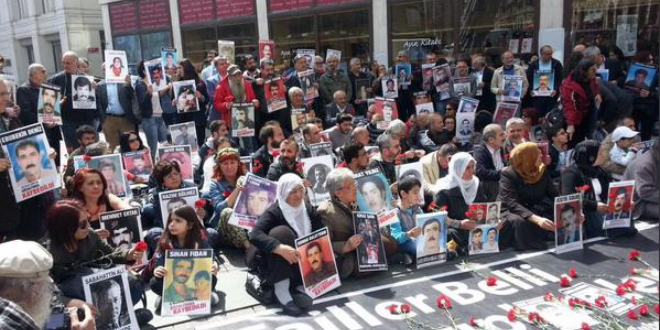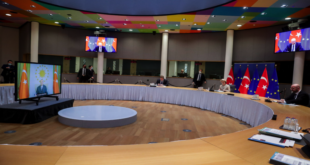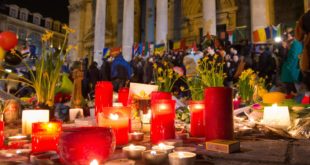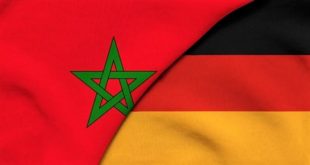This article was translated from Arabic by ForMENA
Commemorating Kurdish collective memory, the “Saturday Mothers” gather in Istiklal Street in Istanbul at 12 PM every Saturday. They carry red flowers and photos of their absent loved ones, presenting them with letters and poetry before continuing their sit-in in silence. In such ways, they remember the approximately 1,000 Kurdish men and women who the rest of Turkey, apparently, has forgotten. Last Saturday was the Mothers’ 525th week of protest, which began when their sons and daughters were “forcibly disappeared” and accused of political crimes by the Turkish authorities in the two decades following the military coup of 1980. Questions regarding their fate have never been answers.
The group held a sit-in for the first time in 27 May 1995 when Hassan Ocak was detained and disappeared in the Turkish prisons. After weeks of questioning the police about his location and demanding his freedom, his corpse was found in the cemetery of the unknown, showing clear marks of torture. “Saturday Mothers” continued to hold sit-ins, demanding that the fate of those they had lost be revealed, until they were violently repressed by the Turkish police. Under such pressure, the Mothers postponed the sit-ins on 13 March 1999, marking the 200thweek. But, ten years later, on 31 January 2009, they started again.
Turkey has witnessed systematic waves of repression, arrests and torture, which have especially targeted leftist figures. Accelerating after the 1980 coup, this reached its peak in early nineties as the Kurdistan Workers’ Party (PKK) started to gain power. Thousands of Kurds joined the PKK to fight state terrorism and violence through armed resistance. In response, the authorities increased their levels of tyranny and launched campaigns of arrests and bloody raids on Kurdish areas in the southeast of the country to suppress the revolt. It was in this period that hundreds of people started to “disappear”, either while under arrest or after being tortured to death.
“Saturday Mothers” demands that the state release documentary evidence showing what happened to their children and they return the corpses of those who died so they can be given a dignified burial. They also campaign for those responsible for the state’s oppressive practices to lose their immunity, be identified and taken to court. The Mothers further insist that state records be released to the public to shed light on state-sponsored political crimes and push for amendments to the Turkish Penal Code. They also highlight the state’s failure to apply Limitation Act to recorded political crimes and cases of enforced disappearance, besides demanding that Turkey sign an international agreement to protect all people from such practices. Recently, the group also called for these demands to be included in negotiations between the Turkish government and PKK.
A few weeks after “Saturday Mothers” resumed their sit-ins in 1995, Amnesty International started publishing reports about the group. In 1996, they held a conference in Istanbul to pressure the government to form a human rights research committee in the Turkish parliament. This ostensibly happened, although in reality the committee merely issued terse statements denying the disappearance of any person while under the custody of the Turkish police. Yet after long years of silence and neglect, a number of mothers had the opportunity to meet with members of the committee and present their demands for the first time in 2011.
The struggle of “Saturday Mothers” to achieve justice has not been without a price. The group has been subject to repression, beatings and arrest by the Turkish authorities. Today, the sit-ins still take place under the strict supervision of the police. Yet the Mothers are still struggling against all odds to save the casualties of enforced disappearance in Kurdish and Turkish collective memory. In the absence of any memorial, commemorative statue or a museum dedicated to the victims, the “Saturday Mothers” have become a living and mobile monument of commemoration. Although none of those responsible for the crimes of enforced disappearance have been held accountable, “Saturday Mothers” have succeeded at least highlighting those crimes and indirectly reducing their regularity.
Such efforts are not limited to Istanbul. At the other end of Turkey, in Roboski village in the state of Şırnak on the eastern borders, Kurdish families held sit-ins for the 172th consecutive week, demanding justice for the Roboski massacre. Families wore black and held photos of its victims, then marched to the village’s cemetery where they said prayers for the souls of their sons.
In 28 December 2011, two warplanes belonging to the Turkish Air Force performed a series of airstrikes on a convoy of 38 people that was crossing the mountainous areas in the village, killing 34 of them. These airstrikes came after intelligence information and photos captured by two drones – one deployed by the United Stated, the other sold by Israel to the Turkish – suggested that an armed PKK group was crossing the border areas into the Turkish territory. The reality was quite different: a group of villagers, all of whom were unarmed.
They were doing what in the hugely marginalised and under-developed Kurdish border areas have long done: trying to eke out a living by smuggling goods across the Turkish-Iraqi border. That night, they ware smuggling cigarettes and diesel in a trip that takes less than 3 hours both ways. 28 of the dead were from the Encü family. Among them were 1 children, who were joining their parents and siblings to work during school holidays.
In January 2012, a month after the massacre, a parliamentary committee was specially formed to investigate it. They published a report in March 2013, which found that the massacre was committed due to a lack of coordination between military figures and local authorities. It was, in other words, just a mistake. The report held no party responsible and accused no individual figures. 18 months after the investigations, the Public Prosecution service reached the same conclusion: that the air force had no intention to kill and that the massacre was the result of neglect. The file was later forwarded to the military court, which decided not to press any charges against any official, in January 2014.
At that time, the then Turkish Prime Minster, Recep Tayyip Erdogan, commented on the incident: “the two warplanes struck the villagers, thinking they were a terrorist group. There was in fact a terrorist amongst them and compensation has been paid to the victims’ families. There’s no need to exaggerate the matter”.
However, the victims’ families refused the compensation offered by the government and insisted on the necessity of achieving justice first. The families still demand that the government apologise, prosecute the killers, remove immunity from those responsible and hold both whoever gave the order to kill and those who executed it accountable. The state responds as it always has done: by covering up the names of offenders and denying any crime.
The views expressed in this article belong to the author and do not necessarily represent ForMENA
 ForMENA Council for MENA affairs
ForMENA Council for MENA affairs




